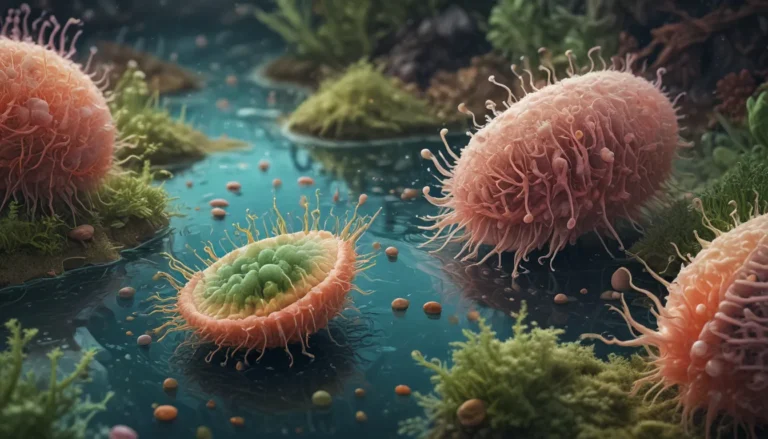A Note About Images: The images used in our articles are for illustration purposes only and may not exactly match the content. They are meant to engage readers, but the text should be relied upon for accurate information.
Welcome to the realm of Genetically Modified Organisms (GMOs), where scientific innovation has transformed the landscape of agriculture and food production. In recent years, GMOs have captured the attention of the world, sparking both enthusiasm and controversy. While advocates hail GMOs as a solution to global food security challenges and a boon to sustainable agriculture, critics express concerns about potential risks to human health and the environment.
In this enlightening article, we delve into 14 remarkable facts about GMOs, shedding light on this intricate and divisive subject. From their historical roots to their far-reaching impact on the economy, environment, and human well-being, these facts offer a comprehensive understanding of the GMO phenomenon. Whether you’re a staunch supporter, a skeptical critic, or an inquisitive observer, this article aims to provide a well-rounded perspective on GMOs and their significance in our world.
Unveiling Key Takeaways:
- Genetic Engineering: GMOs are crafted through genetic engineering, enabling scientists to imbue organisms with specific traits. With centuries of existence, GMOs undergo rigorous safety testing and hold promise for addressing food insecurity and promoting environmental sustainability.
- Diverse Applications: From boosting crop yield to curbing pesticide use, GMOs serve a multitude of purposes. Rigorously regulated and extensively studied, GMOs continue to evolve as a subject of ongoing research, with a focus on enhancing their benefits.
The Marvel of Genetic Engineering:
Genetically Modified Organisms (GMOs) are organisms whose genetic makeup has been altered through sophisticated genetic engineering techniques. This revolutionary process allows scientists to introduce unique traits into organisms, transcending the boundaries of natural evolution.
Centuries of Evolution:
The concept of modifying organisms through selective breeding has deep roots in history, with humans manipulating genetic traits for centuries. However, with the advent of biotechnology, scientists have unlocked the ability to directly manipulate an organism’s DNA in a laboratory, paving the way for the creation of GMOs.
The Multifaceted World of GMOs:
GMOs encompass a vast spectrum of applications, from bolstering crop productivity to enriching nutritional content, fortifying resistance against pests and diseases, and diminishing the reliance on chemical inputs. Their versatility extends beyond agriculture to include contributions to medical research and pharmaceutical production.
A Quest for Safety:
Prior to their commercial release, GMOs undergo rigorous safety assessments to ensure they pose no harm to human health or the environment. Regulatory agencies worldwide have established stringent protocols for evaluating the safety of GMOs, underscoring the commitment to public health and environmental stewardship.
Nurturing Food Security:
GMOs hold the potential to address food insecurity by fostering enhanced crop productivity and resilience, particularly in regions grappling with climatic fluctuations, pest infestations, and crop diseases. These genetically enhanced organisms present a promising avenue for bolstering global food security.
Embracing Environmental Sustainability:
By conferring resistance to pests and diseases, GMOs help curtail the usage of chemical pesticides, thereby lessening the environmental footprint of agriculture. This shift towards bioengineered solutions not only promotes sustainable farming practices but also safeguards the health of farmers and consumers.
A Testament of Safety:
Scientific studies conducted over the years have consistently reaffirmed the safety of GMOs for human consumption. Esteemed organizations such as the World Health Organization (WHO) and the National Academy of Sciences have endorsed the safety of GMOs, equating them with conventionally bred crops.
Mitigating Post-Harvest Losses:
GMOs endowed with extended shelf life and improved spoilage resistance play a pivotal role in reducing post-harvest losses, ensuring a greater quantity of food reaches consumers and minimizing food wastage. This advancement in agricultural technology heralds a more efficient and sustainable food supply chain.
Navigating Labeling Regulations:
GMO labeling regulations vary across the globe, with some countries mandating conspicuous labeling on GMO products while others adopt a more relaxed stance. It is crucial for consumers to acquaint themselves with local regulations and product labels to make informed choices regarding GMOs.
From Supermarkets to Cosmetics:
GMO ingredients permeate a myriad of products lining supermarket shelves, ranging from processed foods and beverages to cooking oils and even cosmetics. In the United States, approximately 70% of processed foods contain GMO ingredients, underscoring the pervasive nature of GMOs in our daily lives.
Vigilant Regulation:
Regulatory bodies such as the United States Food and Drug Administration (FDA) and the European Food Safety Authority (EFSA) diligently oversee the development, testing, and commercialization of GMOs, ensuring adherence to stringent safety standards and environmental regulations.
Pioneering Sustainable Agriculture:
By curtailing the need for chemical inputs, GMOs play a pivotal role in fostering sustainable agricultural practices. Their impact transcends crop production, encompassing water conservation, land preservation, and energy efficiency by mitigating crop losses attributed to pests and diseases.
Embracing Diversity of Perspectives:
The discourse surrounding GMOs has spurred a robust public debate, encompassing a spectrum of concerns from potential health risks to implications on biodiversity and farmers’ livelihoods. Encouraging open and informed dialogues is essential for addressing these apprehensions and fostering a nuanced understanding of GMOs.
A Tapestry of Innovation:
The landscape of GMO research is a realm of perpetual evolution, with scientists continually pushing boundaries to expand the applications and benefits of GMOs. Ongoing research endeavors strive to engineer crops with enhanced nutritional profiles, greater resilience to climate change, and heightened tolerance to environmental stressors.
In essence, these 14 extraordinary facts illuminate the diverse and dynamic realm of genetically modified organisms (GMOs). While GMOs invigorate debates and controversies, their potential to combat global challenges and champion sustainability remains undeniable. Through unwavering commitment to stringent testing and regulation, scientists navigate the intricate landscape of GMOs, ensuring their prudent and secure utilization.
Embracing the Future of GMOs:
As we navigate the terrain of genetically modified organisms (GMOs), we perceive a vibrant tapestry of innovation unfolding before us. Revolutionizing the agricultural landscape and unlocking new vistas in medical research and food production, GMOs epitomize boundless possibilities and transformative potential. While heralding benefits such as augmented crop yield, enhanced nutritional value, and heightened resilience to pests and diseases, GMOs also beckon contemplation on safety, ethical considerations, and environmental impact.
Approaching the discourse on GMOs with an open mind and an informed outlook is paramount. Grounded in scientific evidence and transparent regulations, we embark on a journey of discovery, illuminating the nexus between innovation and responsibility. While GMOs offer a pathway to addressing global food security challenges and fostering sustainable agriculture, vigilance in mitigating risks, ensuring proper labeling, and nurturing public awareness is imperative.
As the dialogue surrounding GMOs unfurls, a commitment to ongoing research and rigorous regulation stands as the cornerstone of striking a harmonious balance between innovation and prudence. By staying attuned to developments, advocating for sustainability, and fostering informed decision-making, we collectively shape the trajectory of genetically modified organisms, steering towards a future steeped in progress and responsible stewardship.
Navigating FAQs on GMOs:
-
What are genetically modified organisms (GMOs)?
Genetically modified organisms (GMOs) are living entities whose genetic material has been refined through modern biotechnology techniques. -
How are GMOs created?
GMOs are crafted by integrating DNA from one organism into another, thereby manifesting specific traits in the modified organism. -
What are the primary motives behind genetically modifying organisms?
Genetic modifications are primarily aimed at bolstering crop productivity, enhancing nutritional value, fortifying resistance to diseases and pests, and diminishing the reliance on harmful chemical pesticides. -
Are GMOs safe to eat?
The safety of GMOs for human consumption is a subject of spirited debate. Nevertheless, numerous scientific studies and regulatory bodies endorse the safety of GMOs for human consumption. -
What environmental concerns are associated with GMOs?
Environmental concerns connected to GMOs encompass the potential for cross-pollination with non-GMO crops, disruption of natural ecosystems, and the emergence of pesticide-resistant pests. -
Are there specific labeling requirements for GMO products?
Labeling criteria for GMO products span a spectrum across countries. Some regions mandate labeling on GMO products, while others adopt voluntary labeling or lack strict regulations. -
Can GMOs alleviate world hunger?
GMOs possess the potential to play a pivotal role in addressing global food security challenges by elevating crop yield, enhancing crop resilience, and lessening post-harvest losses. Despite their potential, GMOs are not a standalone solution to world hunger. -
What does the future hold for GMOs?
The horizon of GMOs is evolving, with ongoing research directing its focus towards crafting precise and targeted genetic modifications. The trajectory aims to tackle specific agricultural and health-related challenges while upholding safety and sustainability.
Embark on a journey of discovery, unraveling the mysteries and marvels of genetically modified organisms (GMOs) as they shape the contours of our modern world. By fostering an open dialogue, embracing innovation with caution, and championing sustainability, we chart a course towards a future where GMOs coexist harmoniously with the natural world, offering a testament to human ingenuity and responsible stewardship.






